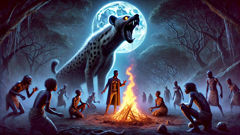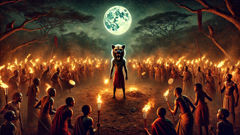Introduction
In the shadowy folds of Angola’s ancient forests, where the moonlight barely seeps through the tangled canopy and the wind whispers secrets to those who listen, tales are born that shape the soul of a people. Among the most chilling and enduring is the legend of the Kishi—a demon both alluring and monstrous, forever straddling the line between beauty and terror. The Kishi is said to walk the land with two faces: one side, handsome and beguiling, capable of charming even the most cautious heart; the other, a snarling hyena with jaws that hunger for the flesh of the unwary. For generations, parents warned their children against wandering too far from the village paths at dusk, and the wise listened, for the Kishi did not hunt like other beasts. It sought not the weak, but those whose curiosity or pride drew them near its handsome visage, only to be devoured by the beast lurking just beyond their sight. This is the story of such a time, when the Kishi’s shadow stretched long over the land, and the fate of a village, and perhaps the very balance between good and evil, rested in the hands of those brave enough to see beyond the mask. In a world where the boundary between the human and the supernatural was as thin as mist, one woman’s courage would test the limits of tradition, and redefine what it meant to face the darkness—both within and without.
The Forest’s Secret: Whispers of the Kishi
Long before the arrival of the Portuguese, before foreign tongues carved new names into the earth, the people of Angola lived by the rhythms of the land. Their villages nestled along the banks of river and stream, fields of millet and cassava stretching into the deep green wilds. For all their closeness to nature, there were places even the bravest avoided: the heart of the forest, where darkness never truly lifted, and where stories grew like roots beneath the soil.

It was there, in the village of N’Dongo, that the legend of the Kishi took root. The elders recalled a time when laughter filled every hut, and the rivers ran clear, but all that changed with the coming of the Kishi. His presence was first noticed in whispers: young women vanishing without a trace, their footsteps fading beneath the ancient trees. Children spoke of a stranger who sometimes appeared at the edge of the fields—a man so handsome that hearts fluttered and breath caught, yet whose eyes held secrets too deep for comfort.
Among those most affected was a woman named Mwila. She was neither the youngest nor the most beautiful, but she was known for her fierce spirit and wisdom beyond her years. Her mother had died young, and her father, an old hunter, taught her to read the language of the wind, to know the moods of animals by their tracks and scents. Mwila grew up with a healthy fear of the forest but also an unquenchable curiosity.
One evening, as the sun dipped low and cast long shadows across the red earth, Mwila overheard her neighbors whispering about another girl gone missing. That night, while the village huddled close around their fires, elders told the story again: of the Kishi, a demon who wore two faces. By day, he was an irresistible suitor—charming, clever, always just out of reach. By night, his true nature was revealed: a hyena’s head with jaws strong enough to shatter bone, teeth stained by the blood of his victims.
Intrigued and unsettled, Mwila watched her friends and sisters warily. She noticed how, in recent weeks, a handsome stranger had lingered by the riverbank, singing songs no one quite recognized. She saw how her cousin Kiala flushed when he glanced her way. The village, desperate for answers, sought out the old diviner, a woman who had lived longer than anyone could remember. The diviner’s eyes, milky with age but sharp as ever, confirmed their worst fears. “The Kishi hunts,” she rasped, “and he will not stop until he is unmasked.”
Determined not to become another tale of loss, Mwila resolved to learn more. She questioned hunters who roamed the deeper woods. They spoke of strange tracks—bare feet alongside paw prints, laughter echoing where none should be. The forest itself seemed to pulse with warning. On the third night after the latest disappearance, Mwila’s own sister failed to return from gathering water. Panic rippled through the village. Fires burned brighter. Songs of protection filled the air, but dread gnawed at every heart.
It was then that Mwila made her decision. She would face the forest herself and seek the truth behind the Kishi’s mask, not only for her sister but for all those lost to the demon’s hunger. Her father tried to stop her, but she would not be swayed. With nothing but a knife, a gourd of water, and charms woven from braided grass, she slipped into the forest before dawn, her heart pounding not just with fear, but with hope—the hope that in confronting the darkness, she might bring light to her people once more.
The Two Faces: Into the Heart of Darkness
Mwila moved like a shadow between the trees, senses sharpened by fear and determination. The forest was alive with sound: the distant cry of an owl, the chirp of night insects, the rustle of leaves underfoot. She followed the narrow paths made by animals and humans alike, feeling the press of ancient eyes watching from the gloom. Every step was a test—a reminder that she was venturing where many had vanished.

She walked for hours, guided by the faintest traces—a scrap of cloth snagged on a thorn, footprints half-swallowed by mud. The deeper she went, the thicker the air became, laced with a musky scent she could not place. At times, she thought she heard laughter: warm and inviting, but echoing with something wild beneath. When the sun was little more than a memory and the moon climbed high, Mwila found herself at a clearing she’d never seen before. In its center stood a fire, burning blue-white and unnatural. Around it, shapes shifted—figures that looked almost human but whose movements were too swift, too fluid.
She crouched low, heart thudding, as the Kishi emerged from the shadows. He wore the face of a prince: high cheekbones, skin gleaming, eyes dark and deep. Women would have called him beautiful, but even from her hiding place, Mwila sensed something wrong—a stiffness in his posture, a flicker of shadow behind him that seemed to move independent of his body.
He sang, voice as smooth as silk, drawing shapes in the firelight. Others joined him: girls from neighboring villages, their faces blank and empty as if trapped in a dream. Mwila’s blood ran cold as she recognized her sister among them, swaying gently to the music. The Kishi’s laughter rang out, and as he turned, the light shifted, revealing the hyena’s head jutting grotesquely from his back—eyes yellow and hungry, jaws slack and drooling.
Mwila fought to keep silent, her hand gripping her knife. She realized now how the demon operated: luring victims with beauty and song, then devouring them once their guard fell. Desperation clawed at her chest. She needed a plan—a way to save her sister without falling prey herself. Carefully, she traced her path back, marking trees with tiny notches for her return.
Returning to the village at dawn, Mwila recounted what she’d seen. The elders listened in horror, confirming their worst fears. But no warrior dared follow her back. The Kishi’s legend was too strong; its terror held even the bravest in thrall. Only one person, the old diviner, stepped forward. “You must trick the Kishi as he tricks us,” she advised, handing Mwila a charm woven from leopard whiskers and river stones. “Hide your fear and use your wits.”
Armed with this advice and courage forged in grief, Mwila returned to the forest the next night. She washed in river water to mask her scent, braided her hair tightly, and wore a necklace of pungent herbs said to ward off evil. At the clearing, she waited until the Kishi appeared again, his song drifting like mist. This time, she approached boldly, feigning enchantment.
The Kishi smiled, his human face dazzling in the moonlight. He spoke sweet words, offering her food and flattery. But Mwila remembered the diviner’s warning and never let her gaze linger on his beauty. Instead, she danced at the edge of the fire, always keeping his back in sight. When he moved to embrace her, she spun away, laughing as if caught in a lover’s game. In those moments, she glimpsed the hyena’s head snapping at the air, hungry and restless.
As dawn approached and the Kishi grew impatient, Mwila feigned exhaustion and collapsed beside her sister. When the demon lowered his guard, she whispered to her sister, urging her to run at her signal. Then, with a sudden motion, she hurled the diviner’s charm into the fire. The flames roared and shifted color, startling the Kishi and his captives alike. In the chaos, Mwila seized her sister’s hand and dashed into the trees. The Kishi howled—both voices merging in fury—but did not give immediate chase.
The sisters stumbled through the darkness, guided by Mwila’s notched trees. Behind them, laughter turned to snarls as the demon pursued. They burst from the forest just as dawn broke over N’Dongo, collapsing at the village edge. The Kishi’s scream echoed behind them but faded with the rising sun. For that day, at least, the sisters were safe. But Mwila knew the battle was not over. To truly defeat the Kishi, she would need to unmask him in the eyes of all—exposing the evil that wore a human face.
Unmasking Evil: The Final Confrontation
Word spread quickly of Mwila’s escape and her sister’s return. The village of N’Dongo rejoiced, but beneath the celebrations ran an undercurrent of dread. The Kishi was wounded but not defeated, and everyone knew he would strike again. Mwila refused to rest. She watched over her family and began teaching others what she had learned: never trust beauty alone, and always be wary of strangers whose shadows moved in unnatural ways.

As weeks passed, the Kishi’s attacks grew bolder. He no longer relied solely on charm; at night, villagers heard hyena calls closer and closer to their homes. Livestock vanished. Shadows flitted at the edge of every fire. Fear threatened to tear N’Dongo apart from within.
Mwila sought out the old diviner once more, desperate for a way to end the Kishi’s reign of terror for good. The diviner revealed a secret passed down through generations: “The Kishi is strongest when unseen. You must force him into the open. Gather the people. Expose both faces to the light, and he will lose his power.”
Armed with this knowledge, Mwila devised a plan. She called a gathering, inviting villagers from miles around. On the night of a full moon—when spirits were closest to the earth—she led them to the clearing where the Kishi hunted. Men and women came armed with drums, torches, and charms. Fear was thick in the air, but hope flickered in every eye.
The Kishi appeared, confident as ever, his human face wreathed in smiles. He tried to scatter the crowd with his words and his beauty, but Mwila stepped forward, torch in hand. She challenged him openly, accusing him of his crimes. The villagers gasped as the Kishi laughed—a sound that curdled blood—and tried to turn his back. But Mwila was ready. She commanded the drummers to play, their rhythms sharp and insistent. As the crowd circled him, torches flared high.
In the dancing light, all saw the truth: where his shadow should have been, there was a second head—twisted, savage, and unmistakably hyena. The Kishi shrieked, caught between two worlds, as villagers recoiled in horror. But Mwila held her ground. She recited ancient words taught by the diviner, invoking the spirits of ancestors and the strength of the earth.
The Kishi’s form flickered and wavered. No longer could he hide behind a mask. His beauty withered; his human face grew gaunt and haggard, while the hyena head snapped and howled. Villagers hurled charms and curses, their voices rising in a crescendo of defiance.
Cornered and exposed, the Kishi lunged at Mwila, jaws gaping. She met his attack with a burning brand, thrusting it into his side. The demon screamed—a sound that echoed for miles—then collapsed, writhing as fire consumed both faces. As his form shriveled and blackened, the forest itself seemed to breathe a sigh of relief.
When dawn came, nothing remained of the Kishi but ashes and a lingering chill. Mwila stood among her people, exhausted but victorious. She had unmasked evil not with brute force, but with courage, wisdom, and the light of truth. The village celebrated for days, honoring not just Mwila but all those who dared face darkness. And from that day forward, parents taught their children that true danger often wore a pleasing face—and that only by seeing with both heart and mind could one hope to survive.
The legend of the Kishi would live on, whispered by firesides for generations to come. Yet it was no longer just a tale of terror; it became a story of resistance, resilience, and the unyielding power of community. And deep in the forest, where the mist clings to ancient roots, the shadows held no more secrets—for Mwila had brought them into the light.
Conclusion
After the flames faded and peace returned to N’Dongo, life took on new rhythms. The forest remained vast and mysterious, but its terrors were now tempered by knowledge and vigilance. Mwila’s courage became the foundation of a new tradition: each year, on the night of the full moon, villagers would gather to tell the story of the Kishi—not as helpless victims, but as a people who faced their fears and prevailed. The legend served as both warning and inspiration: beauty can be a mask for danger; evil often comes dressed in charm; but even ancient darkness cannot withstand the light of truth and unity. As generations passed, Mwila’s name lived on in song and story, a symbol of wisdom and bravery. And though shadows still moved at the edge of firelight and the wind sometimes whispered old names, no one forgot that it is not the face we see that matters most, but the heart and courage within. So the Kishi faded into legend, while Mwila’s legacy—of seeing beyond illusion and standing together against evil—remained forever part of Angola’s living soul.













